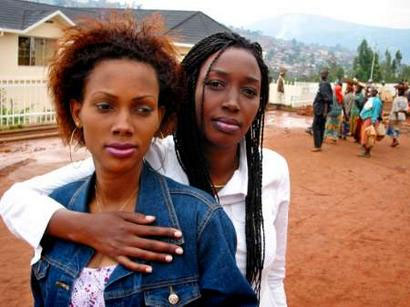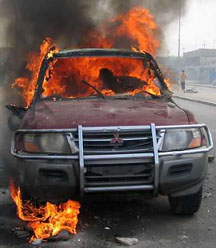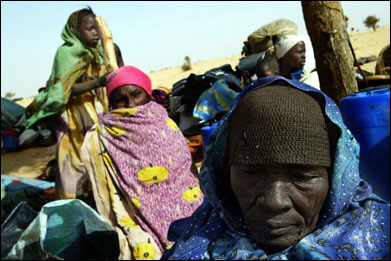
Reuters, 31 March 2004: Survivors of Rwanda's 1994 genocide, sisters Henriette Mutewaraba (R) and Chantal Rutayasire (L), hug in front of the Gisozi memorial site where Henriette works as a tour guide, on March 29, 2004. Rwanda is rushing to complete a $2.5 million genocide museum in time to host next month's memorial ceremonies marking the 10th anniversary of the 1994 mass slaughter, organizers said on Monday. (Reuters photo by Finbarr O'Reilly)
Looking into the hearts of darkness
On 31 March 2004, just as the world was becoming inured to the daily insurgent attacks in occupied Iraq, images from the Sunni partisan stronghold of Falluja were to shock us anew.
Four American private security guards were killed by grenades that struck their vehicle near a bridge crossing the Euphrates river. A mob quickly descended upon their burnt corpses, mutilating them with shovels and picks, parading one body down the streets -- reminiscent of the 1993 scene in Mogadishu, Somalia -- and hanging two more from the bridge.
The shock I felt was not the obvious graphic horror of it all -- with news of similar attacks heard nearly every single day, it was but a matter of time for the rest of the world to witness scenes of that sort. No, my own shock was to realize that, rather than feeling vindicated in making my stand against the war in Iraq all along, I actually felt that there was unfinished business for us Americans there after all.
|
The Horror: On 31 March, 2004, Four American security contractors died in this vehicle, struck by grenades in Falluja, Iraq. The ongoing insurgency was coinciding with the world's observance of the tenth anniversary of the 1994 Rwandan genocide. (Reuters photo by Salman Amer) |
No, we should never have invaded Iraq in the first place -- under false pretenses, no less, vis-à-vis the weapons of mass destruction that were never found. Now that we are there, however, we have no choice but to clean up the mess that we made, and try to leave it a better place than the one we found. Ten years ago this month, we made exactly the opposite mistake. We ignored Rwanda, and allowed more than 800,000 people to be slaughtered by their own kind in just 100 days. That's 8,000 persons -- an entire village -- wiped out in a day, every day, for more than three months. One murder every three minutes. Not even the Nazis, the Khmer Rouge or the neighboring Ugandans under Idi Amin could butcher that many people so quickly. Rwanda, long ago, wasn't like that. |
Joining the Hutu tribes that got here a little earlier, the Tutsis settled into this New Jersey-sized African country of fertile red clay, lush cloud forests and gorillas in the mist, back in the 1300s AD. Over the centuries, they merged as one people, sharing a common language and culture.
Then, in 1916, imperial Belgium re-divided and conquered them. The colonialists forcibly labeled each Rwandan with one ethnicity or the other, while cultivating the minority Tutsis as their proxy ruling class.
|
Don't let it happen again: Refugee women from the western Sudanese region of Darfur rest in the heat of the desert on 27 January, 2004 in the improvised Tine refugee camp in Chad. The United States condemned ongoing violence in Sudan's western Darfur region and demanded that Khartoum rein in pro-government Arab militias that are conducting ethnic cleansing in the area. To date, more than 100,000 refugees have fled western Sudan into Chad. (AFP photo by Marco Longari) |
The two groups have been warring intermittently ever since, well before and after their independence in 1962. In 1994, the plane carrying the presidents of Rwanda (a Hutu) and Burundi was shot down, allegedly by Tutsi rebels. Hutu extremists responded by killing the moderate Hutu prime minister and the ten Belgian soldiers guarding her, prompting the former colonial overlords to pull out all their peacekeeping troops. The usurpers then went on the radio, ordering all Tutsis and their Hutu friends to be exterminated as a matter of civic duty. Seemingly lacking any will of their own, the machete-wielding killers carried out one massacre after another while their victims, finding no refuge in churches, schools or their neighbors, died where they stood with no resistance whatsoever. The slaughter went on until the Tutsi rebels retook what was left of their country. |
What did America and its European allies do in those hundred days? They evacuated their nationals from Rwanda, and abandoned it for good. The few aid workers and UN peacekeepers that remained were left to their own devices, saving as many people as they could at the cost of their own lives.
I am now too cynical to believe that America, or any erstwhile colonial power, can truly instill a respect for human rights outside its own borders. Short of occupation and regime change, we will never remove a corrupt, homicidal despot from his tribal fiefdom -- and even then, we have no certainty in the quality of our own example. The least we can do for the people of the proverbial third world, then, are to give them food and medicine when they need them, trade fairly with them when they are able, and to prosecute the tyrants, thieves and murderers amongst them at every opportunity, should they fail to do so for themselves.
Source: BBC online, PBS (Frontline: "The Ghosts of Rwanda"), Reuters
-- CW, 2 April 2004
| Back to top |


